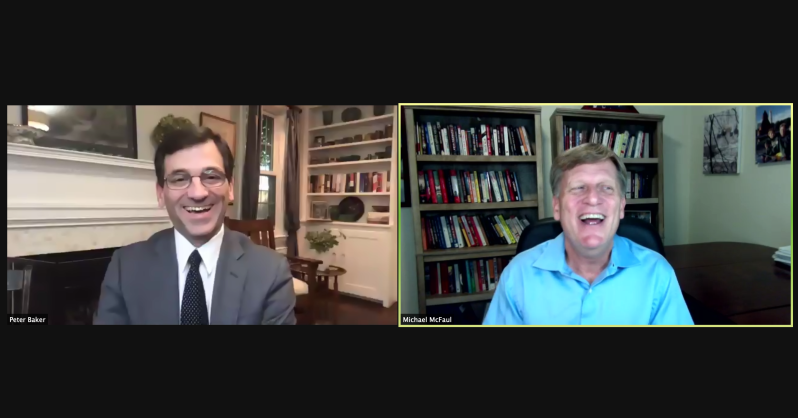James Baker’s “story is the story of Washington — how Washington really worked then and how it works today,” author Peter Baker said of his latest book, “The Man Who Ran Washington: The Life and Times of James A. Baker III,” during a book talk on Oct. 9.
Professor Michael McFaul ’86 M.A. ’86, director of the Freeman Spogli Institute for International Studies, hosted the talk with Baker, political journalist for The New York Times and six-time author, to discuss his latest book. Co-author Susan Glasser, political journalist and staff writer for The New Yorker, was unable to attend the book talk due to health issues.
The book chronicles the life and legacy of former White House Chief of Staff and Secretary of State James A. Baker.
Over the course of seven years, Baker and Glasser conducted 215 interviews, including three presidents, two vice presidents and five secretaries of state, exploring the politics and statesmanship Baker engaged in while working under Presidents George H. W. Bush and Ronald Reagan.
The polarization and dysfunctional nature of politics today makes the story of James Baker even more important, according to Peter Baker.
“Washington has become a place that just does not work,” Baker said.
Expressing that he does not want to romanticize the past, Baker said that Washington today is the inverse of what it was during Baker’s time. Specifically, Baker cited the lack of a recent COVID-19 relief bill, despite the fact that Democrats, Republicans and President Trump have “every reason” to pass another relief package. While Congress passed the $2.2 trillion CARES Act in March, more recent talks in Washington over further stimulus have stalled.
“If James Baker were around, they would have had a deal,” Baker said. “It may not be what everyone wanted — the Democrats would be disappointed, the Republicans would be disappointed — but there would be a deal. It would happen.”
Although James Baker was a conservative Republican, “he wouldn’t stand on ideology or ceremony on any negotiation because it was too important to get stuff done,” Baker said.
For him, “compromise is not a dirty word — it’s how things get done.”
According to Baker, compromise does not happen now because there is no longer a political incentive to make a bipartisan bill. Parties are more homogenous and do not interact ideologically or personally, as they did in the past.
He added that writing books about America’s political history helps Baker and Glasser better understand the present.
“It was helpful for me and Susan [Glasser] to spend time everyday or every week in the past — a little time traveling to a different era — because it puts today’s era in context to help us see what’s different and what’s not,” Baker said.
Baker recounted one experience during President Trump’s impeachment trial earlier this year.
After covering the trial, Baker found a memo in his files written by James Baker. The memo included information about Republicans coming into the Oval Office to try to get President George H.W. Bush and James Baker to ask Russia for information about Bill Clinton that they could use against him. James Baker wrote that he and Bush refused to do so.
“To see that memo at that exact moment with today’s events, I thought really put things in context,” Baker said. “That was the standard of the time; if you did that, that was crossing the line.”
When asked if there was a chance for people like James Baker to ever run Washington again, he said, “it is a man and a moment thing.”
“I don’t think that Baker would be as successful today because the incentives have changed, the structure has changed,” Baker said.
Baker said that former White House Chief of Staff Leon Panetta and former Secretary of Defense Robert Gates, are similar to James Baker in their pragmatic work across party lines. However, fundamentally, Baker does not think they could accomplish as much as James Baker did due to the lack of incentives to compromise.
“The system doesn’t really offer them the opportunities that would make that possible,” he said.
Contact Malaysia Atwater at matwater ‘at’ stanford.edu.
